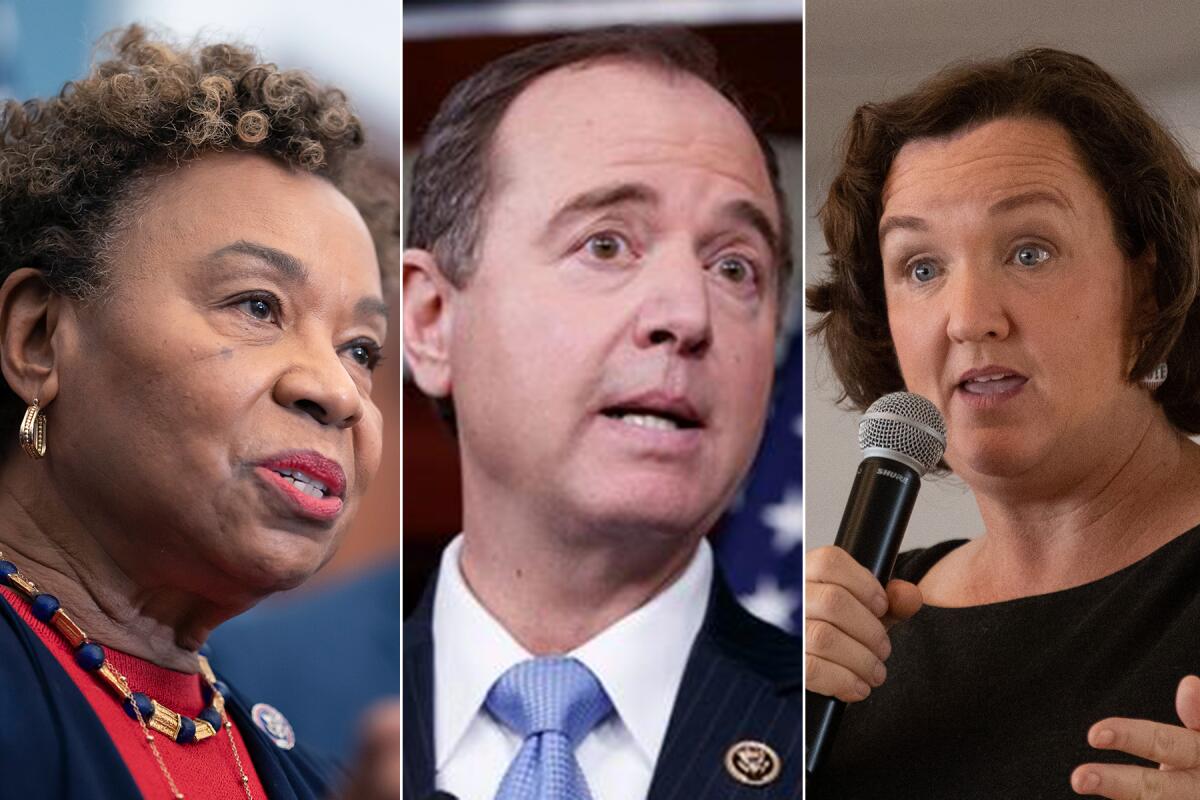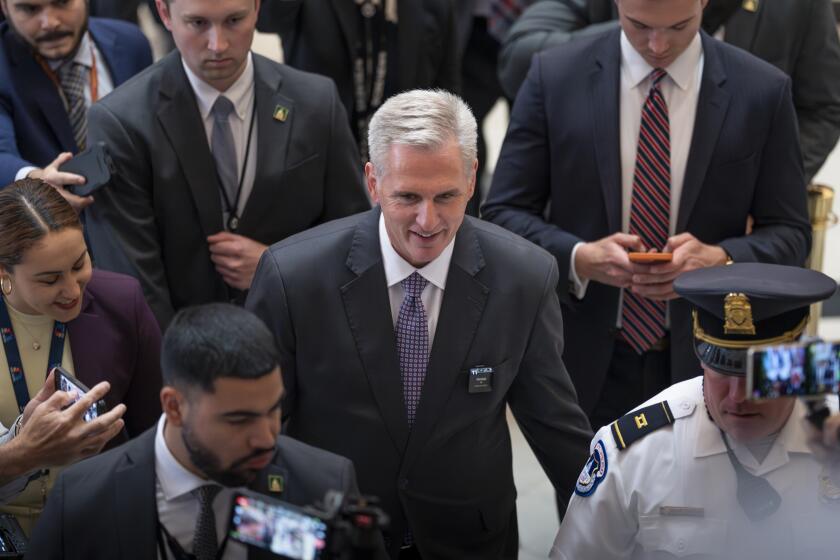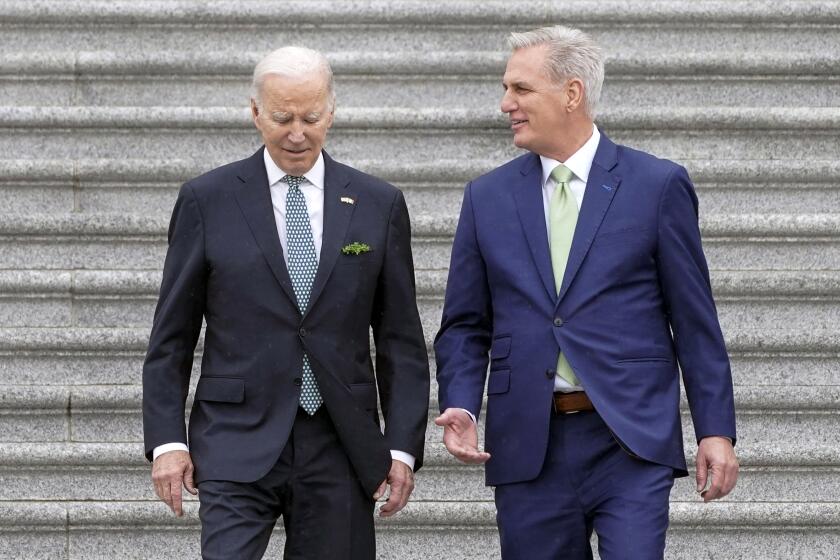Debt ceiling vote splits Democratic candidates for Feinstein’s Senate seat

- Share via
WASHINGTON — In the race to replace Dianne Feinstein in the Senate, the three major Democratic candidates call themselves progressives, hold nearly identical stances on most major policy issues and boast strikingly similar congressional voting records.
But Wednesday evening’s 314-117 vote on the deal by President Biden and House Speaker Kevin McCarthy (R-Bakersfield) to raise the debt ceiling created a wedge issue that split the three, deepening their months-long debate over their progressive bona fides.
Rep. Adam B. Schiff of Burbank was the sole Democratic Senate candidate who joined 164 other Democrats and 149 Republicans in voting to approve the package, which will suspend the nation’s borrowing limit until 2025 and imposed cuts on certain federal programs that are popular among Democrats.
Reps. Barbara Lee of Oakland and Katie Porter of Irvine, meanwhile, joined 44 other Democrats in voting against the proposal, maintaining that the president and his negotiators should not have allowed Republicans to advance their policy agendas in the face of a potential economic disaster.
In addition to opposing what they characterized as debt ceiling “hostage taking,” Democrats who voted against the bill criticized measures that ease permitting for energy projects and add new work requirements to safety net programs such as SNAP, also known as food stamps.
The House of Representatives passed President Biden and Speaker Kevin McCarthy’s deal to suspend the federal debt ceiling through 2024.
Schiff, who describes himself as a progressive but is not a member of the Congressional Progressive Caucus, said he voted for the McCarthy-Biden package for the same reason that most other Democrats did: to avoid “a disastrous default.”
A Schiff spokesperson stressed that voting for the bill doesn’t make the congressman less progressive than his colleagues. A majority of the Congressional Progressive Caucus voted for the measure, and the nation’s largest federation of unions, AFL-CIO, signaled its approval, the spokesperson noted.
Still, in a tight race in which candidates’ similarities make standing out difficult, any vote can send a signal.
Schiff emphasized that he is a progressive like Lee and Porter but said that his pragmatism and ample experience have allowed him to achieve more tangible victories.
“The race comes down to a choice of results or rhetoric,” Schiff told The Times in an interview. “My constituents and Californians want results. They want their members of Congress … to create jobs, not destroy them. And a default would have been just devastating.”
But for members of the San Jose chapter of Indivisible, a progressive group founded after Donald Trump was elected president, Schiff’s vote was “a black mark,” according to Deborah Garvey, a member of the chapter’s leadership team.
“I would support a progressive Democrat over a corporate, more moderate Democrat,” Garvey said. “So as much as I like Adam Schiff … I would not vote for him.”
Garvey said her group thinks Democrats should not have negotiated with Republicans over the debt ceiling. Although the chapter hasn’t endorsed a Senate candidate, she said Wednesday night’s vote was confirmation that Schiff was out of the running.
Patti Crane, a member of the Indivisible South Bay L.A. chapter, said her caucus includes supporters of each candidate — and that differences among them have already become clear. But she didn’t think that what she called the Republicans’ “stunt” in the House would have much influence on how Californians vote come the primary in March. She noted that many voters already saw Schiff as less progressive than Lee and Porter.
Schiff told The Times he doesn’t believe Californians are overly concerned with labels. They feel strongly, he said, that “you can’t be progressive unless you’re willing to make progress and get things done.”
The three representatives come from different backgrounds. Schiff became nationally known as the lead prosecutor in former President Trump’s first impeachment; Lee gained prominence as the sole vote against the measure authorizing President George W. Bush to use military force after the Sept. 11, 2001, attacks; Porter is famous for pulling out charts and graphs on the House floor and for her upbringing in rural Iowa. But they all identify as progressives, and they’re each working to convince voters that their particular flavor of progressivism is superior.
For Crane, that distinction won’t come from their votes on the debt ceiling.
“As the primary season moves along, we’re gonna see more of the nuanced differences,” Crane said. “But I trust Californians. I don’t think we need stunts to figure that out. Californians are too wise to fall for that.”
Hans Johnson, president of Los Angeles’ East Area Progressive Democrats, which hasn’t yet endorsed a candidate, agreed. “It may give ammunition to people who want to lob salvos at Adam Schiff over this issue,” he said. “But I ultimately don’t think it’s going to be a very consequential issue in people’s determination of whom they’ll select for the open Senate seat.”
Johnson said that his organization had a long relationship with Schiff, who has deep ties to Los Angeles County Democrats after representing them for decades in Sacramento and Washington. He noted that Schiff sends club members birthday wishes and that the Burbank resident is technically a member of his group.
The population center will be pivotal in the primary, so courting Democratic clubs like Johnson’s is essential.
The club’s members are less familiar with the other two candidates, he said.
The congressman’s vote, Johnson said, “replicates Adam’s long-standing adherence to a sense of pragmatism and responsibility.”
“I think our members probably admire that vote,” Johnson added, “because of context and awareness of the stakes.”
Porter’s office declined to comment on how the congresswoman’s vote could affect the race. In a statement after members of the House voted, Porter slammed the agreement for containing concessions to the oil industry, which she said has too great of an influence in Washington.
“Californians know that preventing default and protecting our environment are nonnegotiable. Today’s vote wrongly pits these two values against each other,” Porter wrote. “This legislation contains giveaway after giveaway to Big Oil. … I cannot support locking California into years of backward thinking on our economy and our environment.”
Solar and wind farms might benefit from easier federal approval. But so will a giant gas pipeline.
Lee said her no vote had less to do with a political calculus related to seeking higher office and more to do with her aversion to the cuts included in the agreement.
In a statement to The Times on Thursday, she said that she doesn’t vote “based on political campaigns.”
“This vote was about standing up to extreme MAGA republicans holding our economy hostage and standing up for my constituents and the 20 million Californians that are one paycheck away from poverty,” Lee wrote. “That’s what I’ve done my entire career and what I will do in the U.S. Senate.”
All three candidates are racing to raise money ahead of the March primary, with Schiff and Porter boasting massive hauls in what could be the most expensive Senate race in U.S. history. The next indicator of each candidate’s fundraising prowess will come in July, when their campaigns report second quarter numbers.
More to Read
Get our L.A. Times Politics newsletter
The latest news, analysis and insights from our politics team.
You may occasionally receive promotional content from the Los Angeles Times.













